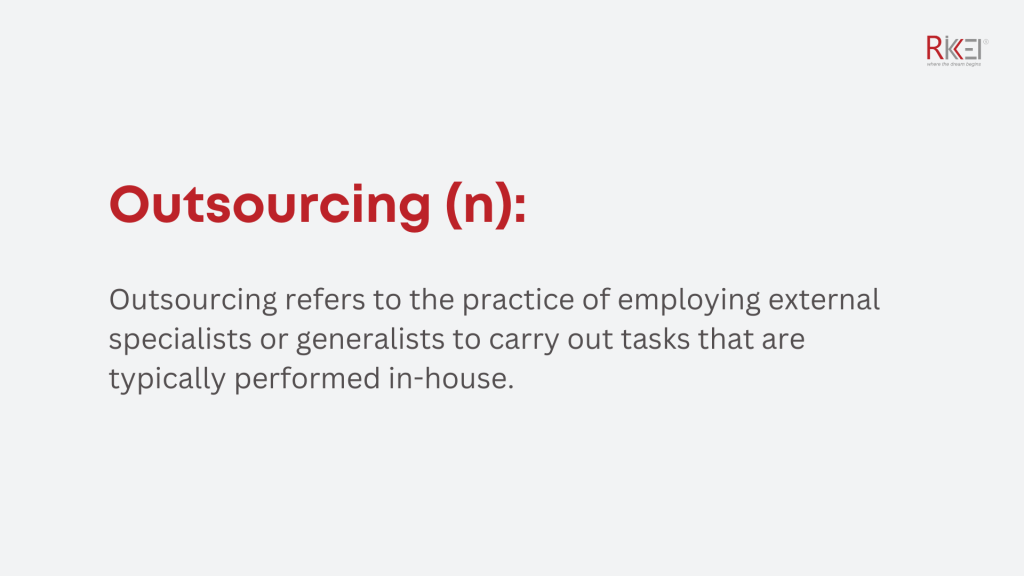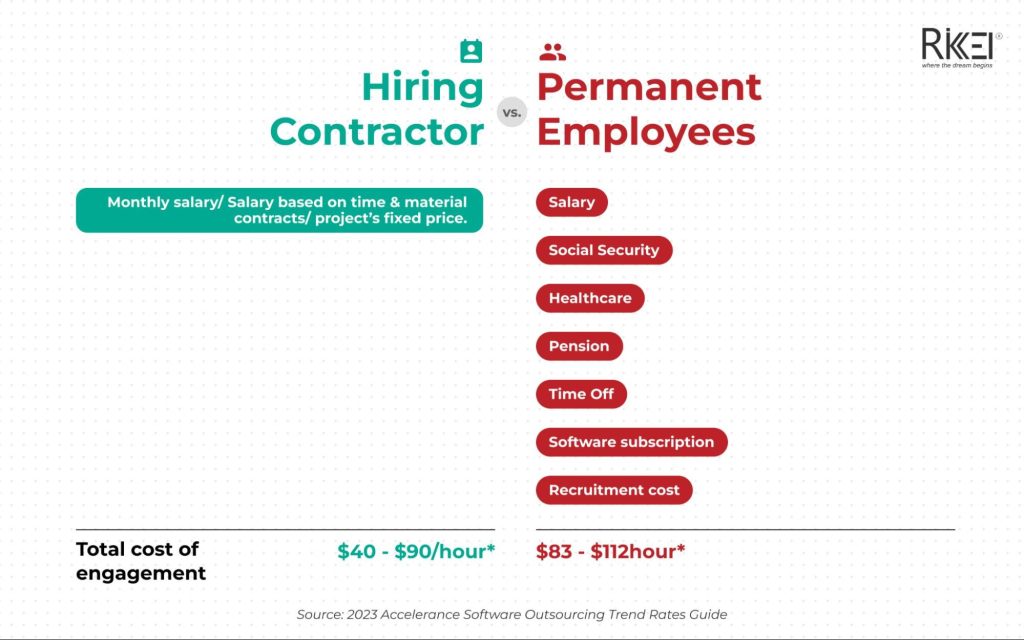Pros and Cons of Outsourcing for Your Business
Contents
Have you ever considered the idea of outsourcing some of your tasks or jobs? There are various advantages of doing so, ranging from product development to sales and marketing. As outsourcing is projected to increase in the future, it is an excellent time to become more familiar with this topic. However, it is crucial to weigh the pros and cons of outsourcing before making any decisions. Additionally, it’s essential to acknowledge some tips and tricks for outsourcing.
What is Outsourcing?

Outsourcing refers to the practice of employing external specialists or generalists to carry out tasks that are typically performed in-house. This often involves assigning laborious or repetitive tasks to various departments, such as human resources, accounting, administration, and customer service. The ultimate goal is to create more time for your team to concentrate on tasks that generate more revenue.
According to a recent study by Deloitte, the primary reason for outsourcing is to lower operating costs. This rationale makes sense, particularly during a pandemic, as economic uncertainty has refocused attention on financial considerations.
Businesses also outsource work to enhance the way they operate, become more adaptable, and accelerate their speed to market.
Outsourcing vs Offshoring
Although outsourcing and offshoring are often used interchangeably, it’s important to recognize the difference between the two. Outsourcing refers to hiring a third party to provide a service or manufacture a product that a company previously handled in-house. This can include hiring companies or individuals, and does not necessarily involve foreign providers.
However, some companies do choose to outsource to foreign countries, like when a US car company produces cars in the US using parts made in Canada by a Canadian company. In contrast, offshoring involves relocating some or all of a company’s operations to another country, such as when a US car company establishes its own factory in Canada or a company sets up call centers in another country.
When discussing outsourcing in the context of US politics, people often use it as a catch-all term to refer to both outsourcing to foreign companies and offshoring.
Now, to know whether outsourcing is good or bad to your company, please proceed to the following sections.
Pros of Outsourcing
1. Cheaper Than Hiring Full-Time Staff

Outsourcing some tasks, like content writing or accounting, can be more cost-effective than hiring a permanent employee.This approach can help you save money on expenses such as onboarding, healthcare coverage, and compensation.
2. Quicker Turnaround
Based on the task, the person you outsource may only handle one project at a time. However, if you hire a freelancer to work on your project exclusively, it may be completed more quickly. By agreeing on a timeline beforehand, you can establish clear expectations for when you expect the project to be completed. Since a freelancer does not have the same obligations as a full-time employee, you can set ambitious but achievable deadlines.
3. Specialization
If you need a designer with expertise in stop-motion graphics, outsourcing can provide an efficient solution. Instead of hiring a full-time designer whose experience is diverse, you can hire an agency or freelancer who specializes in stop-motion. This approach enables you to access the expertise you require for your specific project without having to hire a generalist.
4. Gain Access to More Talent
One of the perks of outsourcing is that you can acquire top-notch software development services from the opposite end of the globe on an outsourced basis. By employing the same project management guidelines and collaboration tools, you can enjoy all the incredible advantages of outsourcing.
5. Can Prevent Burnout of Full-Time Staff
Outsourcing can be a lifesaver when you lack the funds to hire a full-time employee but require some support for your current team. By removing basic duties or lengthy ventures from their to-do lists, you can maintain the satisfaction of your salaried staff and sidestep the expense of exhaustion and employee attrition.
6. Can Increase Company Profits
Companies often outsource to cut costs and boost profits, typically by shifting production to countries with lower labor costs. Although outsourcing may lead to local job losses, the potential increase in profits is enticing. Additionally, outsourcing can help companies save on expenses related to employee training and hiring, and can also aid in business expansion.
7. Save Time On Hiring Employees
Outsourcing pre-approved specialists can save time and money by eliminating the need for hiring and researching. Hiring an outsourced team can take as little or less time than hiring a single in-house developer, resulting in significant time and cost savings.
8. Create Job Opportunities for Developing Countries
Outsourcing advocates argue that while outsourcing and offshoring can cause job loss in the developed world, underdeveloped nations benefit more. Plus, their gains outweigh the losses experienced by affluent countries like the US.
Critics may object, but outsourcing can create better-paying jobs and expand employment opportunities in the developing countries where companies in developed areas outsource their work. Some analysts consider this a positive outcome, as it could gradually reduce the economic disparity between wealthy and poor regions.
9. Strengthen International Bonds
According to some experts, increased international trade decreases the likelihood of war between nations and enhances cooperation in achieving common objectives. If outsourcing strengthens connections between companies from different countries, it could also improve the political ties between their respective governments.
10. Flexible Capacity and Scalability of Teams
Software development outsourcing offers an “on-demand” service that allows for flexibility in scaling a project according to its needs. Visualize a scale between cost and skills to understand this concept, and appreciate the freedom this approach provides. The ability to scale a project as required offers significant advantages in terms of time and money.
Cons of Outsourcing
1. They’re Not Familiar With Your Company
Although a skilled freelancer will endeavor to grasp your company’s objectives, identity, and tone, it is impractical to anticipate that they will have the same level of comprehension as a permanent staff member.
2. Quality Control Can Be Difficult
Ensure that you monitor the freelancer’s progress during the contract period. Nothing is more distressing for both parties than receiving a final product that does not meet the required standard.
3. Issues Related to Communication and Culture
A majority of businesses consider communication to be a significant obstacle in outsourcing. This can stem from a range of factors, including differences in culture (both at a national and organizational level), language barriers, and the dispersed nature of teams.
Moreover, the client/service provider dynamic can exacerbate this challenge, with service providers feeling pressured to accommodate the client’s demands without questioning their feasibility. This approach can result in unmet expectations and disappointment in the final outcomes.
4. Costs Can Be Higher Than Expected
Outsourcing is commonly assumed to lower expenses by capitalizing on economies of scale and cheaper labor in other countries. Nonetheless, there is a saying that warns against choosing the cheapest option and then later having to pay twice. It is essential to ensure that any initial cost savings don’t come at the expense of other factors, such as slower delivery times or inferior quality that could result in delays and additional expenses.
5. Potential Job Loss
One bad side of outsourcing is the reduction of jobs. The fact that workers in foreign countries may be receiving employment opportunities they did not have previously is of little consolation to those in domestic manufacturing communities who have been severely impacted by factory closures.
6. Lack of Experience With Remote Teams
The main reason why businesses prefer in-house development over outsourcing is the risk of different project expectations. This concern becomes more serious if a company doesn’t have digital experts and cannot evaluate the output of the outsourcing provider. In such a scenario, a company may find defects in the product after paying for it.
7. Quality Drawbacks
We are currently in a time where working remotely is becoming more prevalent. In fact, numerous businesses are fully remote. This type of work arrangement enables companies to access a wider pool of talent, and allows individuals to work in their most productive environment, wherever and however that may be.
Tips for Outsourcing
Now I hope you’ve answered your own questions “What are the advantages and disadvantages of outsourcing?”. If you lean toward outsourcing, there are some tips you should keep in mind.
- Identify your outsourcing goals early. At the outset of outsourcing, it’s important to identify your objectives. Determine your motivations for outsourcing and what you hope to accomplish with the project. By answering these questions, you can establish your outsourcing goals. It’s crucial to share these goals with your outsourcing partner so that both parties have a clear understanding of the desired outcomes.
- Choose the proper outsourcing engagement model. When deciding on the outsourcing model to use, take into account your outsourcing objectives, the services you want to outsource, and your budget. Keep in mind that each outsourcing model has its own set of features.
- Begin with teams as small as one to two. To gain a reliable understanding of a third-party service provider’s capabilities, it’s advisable to begin with a small team consisting of one to two members, especially if it’s your first time working with them. If the outcome meets your expectations, you can then gradually expand and assign your outsourcing partner with larger or more significant projects.
Conclusion
After mulling over the pros and cons of outsourcing, you now can decide whether outsourcing is good or bad for your company. Different companies have different approaches: some outsource their entire IT department, while others use consultants to supplement their internal resources. Some companies use a combination of outsourced consultants and their own internal team. The decision ultimately depends on the specific needs of your organization.
More From Blog

August 8, 2024
Data-Driven Product Development: Strategy To Drive More Sales
As a business owner, you want your products or services to be well-received upon launch. The most effective way to create a product that satisfies a broad range of customers is to gain insights into their needs and behaviors from the outset. The key lies in data-driven product development, a strategy that many companies have […]

August 8, 2024
7 Steps To Establish A Data-Driven Governance Program
While data-driven approaches significantly benefit organizations in various ways, failure to govern the huge data sets will hurt your business even more. Effective data management also ensures data quality and security. That’s why there is an increasingly high demand for data-driven governance programs. Continue reading for a detailed guide! What Is Data-Driven Governance? Surprisingly, many […]

August 8, 2024
Data-Driven Business Transformation: 7 Steps To Follow
Data empowers businesses to make well-informed decisions in different departments, like marketing, human resources, finance, and more. As a business owner, you should also employ data-driven approaches to skyrocket productivity and efficiency. If you are still new to this concept, scroll down for an in-depth guide on data-driven business transformation. What Does A Data-Driven Business […]

August 8, 2024
Data-Driven Security: Transforming Protection Through Analytics
Cybersecurity was once an afterthought for most organizations. But in today’s digital landscape, it has become mission-critical. With this transformation has also come a shift in how security decisions are made. Rather than relying solely on intuition and tradition, leading organizations are embracing data-driven strategies. By using metrics and insights around threats, vulnerabilities, and more, […]

August 8, 2024
Differences Between Data Science and Computer Science
Data Science and Computer Science are distinct fields overlapping in certain areas but have different focuses and objectives. The article below will help you clearly understand the differences and the close connection between the two fields. What is Data Science? Data Science is an interdisciplinary field that combines scientific methods, processes, algorithms, and systems to […]

August 8, 2024
How Real-Time Data Analysis Empowers Your Business
In today’s fast-paced business landscape, the ability to quickly make data-driven decisions has become a key differentiator for success. Real-time data analysis, the process of analyzing data as soon as it’s generated, has emerged as a powerful tool to empower business across industries. By leveraging real-time data analysis, organizations can gain timely and actionable insights, […]

